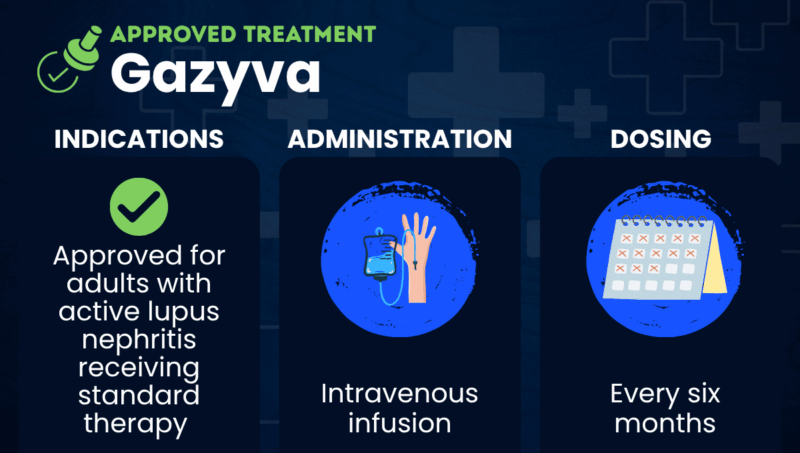
Gazyva (obinutuzumab) for lupus nephritis
Last updated Oct. 21, 2025, by Lindsey Shapiro, PhD

What is Gazyva for lupus nephritis?
Gazyva (obinutuzumab) is a medication approved in the U.S. for adults with active lupus nephritis who are receiving standard therapies. The treatment is given via infusions into the bloodstream (intravenously).
Lupus nephritis is a serious complication of lupus in which the immune system mistakenly launches inflammatory attacks that damage the kidneys and can eventually cause them to fail. These attacks are mediated by antibody-producing immune B-cells.
Gazyva is an antibody therapy designed to bind to the CD20 protein on the surface of B-cells, leading to their destruction. By lowering the number of these disease-driving cells, Gazyva is expected to limit further kidney damage in people with lupus nephritis, potentially delaying or preventing the progression to kidney failure.
In the U.S., Gazyva is codeveloped by Roche subsidiary Genentech and Biogen. It is also approved for treating certain blood cancers. Gazyva is also under active investigation for other lupus indications, including for children and adolescents with lupus nephritis and adults with systemic lupus erythematosus (SLE).
Therapy snapshot
| Brand name: | Gazyva |
| Chemical name: | Obinutuzumab |
| Usage: | Used to treat adults with active lupus nephritis |
| Administration: | Intravenous infusion |
Who with lupus nephritis can take Gazyva?
Gazyva is approved in the U.S. for adults with active lupus nephritis who are receiving standard therapy.
The therapy should not be used by people with a known history of serious immune reactions, or hypersensitivity, to Gazyva or any of its ingredients. This includes a serious type of reaction called serum sickness.
Gazyva also comes with a boxed warning noting that it could cause life-threatening infectious complications, specifically:
- reactivation of the hepatitis B virus (HBV), leading to liver failure or death
- progressive multifocal leukoencephalopathy (PML), a rare and often fatal brain infection
How is Gazyva administered in lupus nephritis?
Gazyva is given via intravenous infusions administered by a healthcare provider at a recommended dosage of 1,000 mg.
The first two infusions are given two weeks apart. About six months later, infusions three and four will also be given two weeks apart. Thereafter, infusions will be administered every six months, or twice yearly.
Initially, infusions may take 3-5 hours. Starting with the second dose, patients who did not experience any severe infusion-related reactions during a previous infusion may be eligible to receive subsequent doses over 1.5 hours. Patients will receive medications before each Gazyva infusion to reduce the risk of a reaction.

Gazyva in lupus nephritis clinical trials
Gazyva’s approval for lupus nephritis was supported by data from two clinical trials involving adults with lupus nephritis who were receiving standard therapy regimens. The data generally showed that Gazyva led to higher rates of complete renal responses — a composite measure that suggests kidney function has improved without the need for rescue medications — relative to standard therapy alone.
- REGENCY (NCT04221477) is a Phase 3 trial in which nearly half of the participants on Gazyva plus standard care achieved a complete renal response after about 1.5 years compared with about a third of those on standard therapy alone. The treatment was also associated with other indicators of improved disease control.
- NOBILITY (NCT02550652) is a completed Phase 2 trial in which significantly more patients on Gazyva achieved a complete renal response than in the standard care group after one and two years of treatment.
Ongoing trials are evaluating Gazyva for other lupus indications:
- A Phase 2 trial called POSTERITY (NCT05039619) is evaluating the safety and efficacy of Gazyva in children and adolescents with lupus nephritis.
- A Phase 3 trial called ALLEGORY (NCT04963296) is assessing Gazyva’s safety and efficacy in adults with SLE, or lupus that may affect organs other than the kidneys.
Gazyva side effects
The most common side effects associated with Gazyva in people with lupus nephritis include:
- upper respiratory tract infection
- COVID-19
- urinary tract infection
- airway inflammation (bronchitis)
- pneumonia
- infusion-related reactions
- low blood counts of neutrophils, a type of infection-fighting immune cell
Because Gazyva can cause HBV reactivation, patients should be screened for the virus before starting treatment. HBV-positive patients should be monitored closely, and Gazyva should be discontinued in the event of reactivation. PML has been reported in cancer patients who have been treated with Gazyva, so patients will also be monitored for neurological changes occurring during treatment.
Other serious infections are also possible with Gazyva. The therapy should not be given to people with an active infection.
Gazyva has also been associated with less common, but more serious adverse events, including:
- severe or life-threatening infusion-related and hypersensitivity reactions
- severe or life-threatening low blood cell counts
- harm to a developing fetus during pregnancy
Some vaccines may not be safe to receive during treatment. Patients should talk with their doctors before receiving any vaccinations.
Lupus News Today is strictly a news and information website about the disease. It does not provide medical advice, diagnosis, or treatment. This content is not intended to be a substitute for professional medical advice, diagnosis, or treatment. Always seek the advice of your physician or other qualified health provider with any questions you may have regarding a medical condition. Never disregard professional medical advice or delay in seeking it because of something you have read on this website.
Recent Posts
- Galápagos’ oral therapy for lupus fails to meet key trial objective
- What I learned about navigating travel anxiety with lupus
- To my ‘forever nurse,’ who finally gave me my diagnosis of lupus
- New analyses show Benlysta may aid flare control, kidney health
- Can art therapy help lupus patients improve cognitive function?
